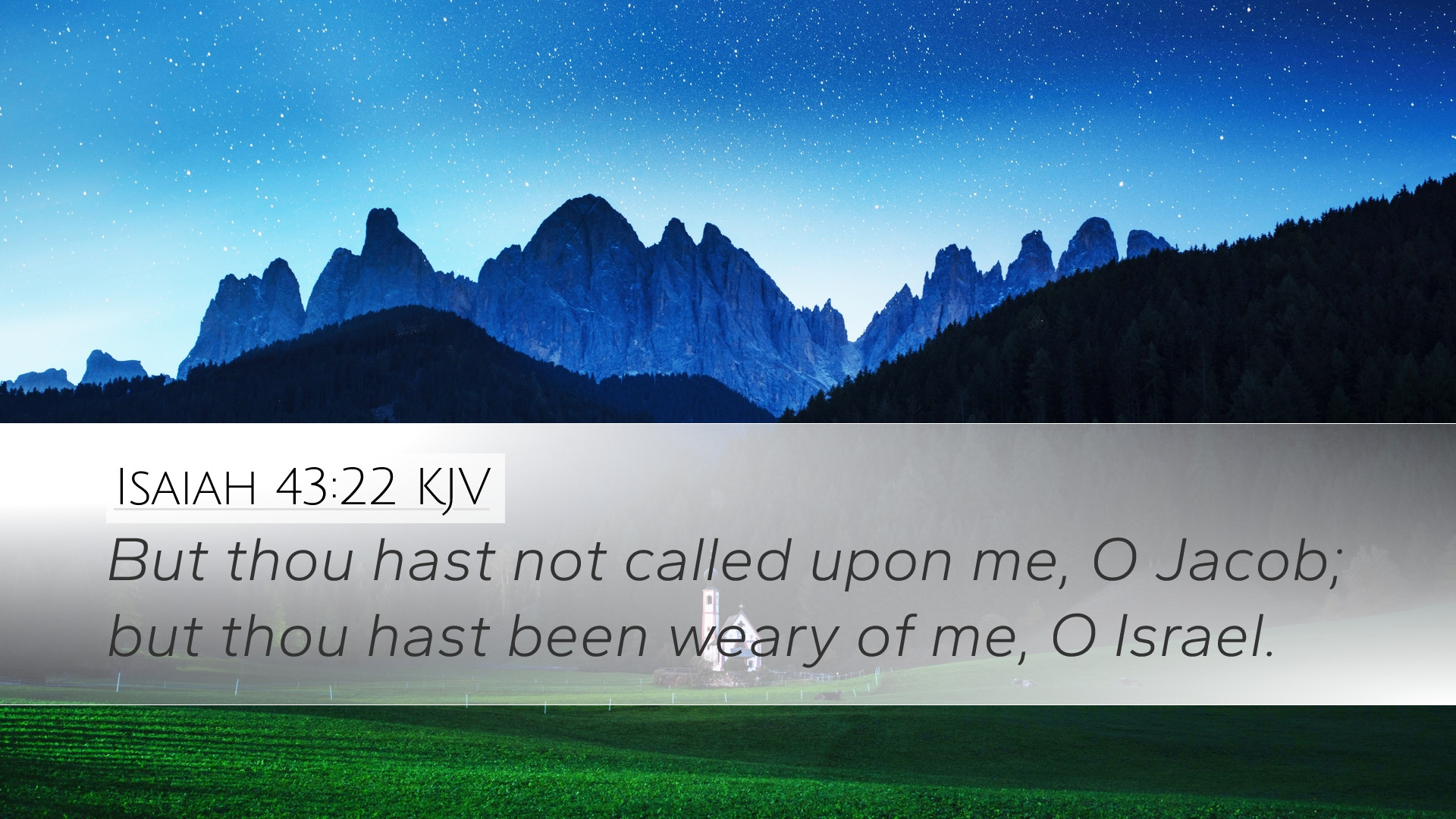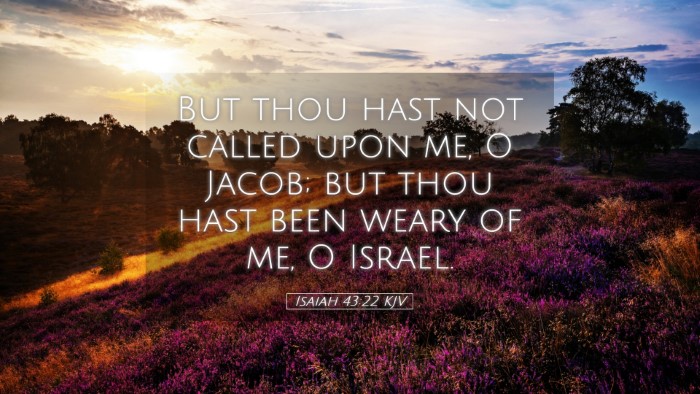Commentary on Isaiah 43:22
Isaiah 43:22 states, "But thou hast not called upon me, O Jacob; but thou hast been weary of me, O Israel." This verse stands as a poignant reflection of the spiritual state of Israel, highlighting their forgetfulness and the weariness in their relationship with God. This commentary draws insights from notable public domain sources, including Matthew Henry, Albert Barnes, and Adam Clarke.
Context of Isaiah 43
To understand this verse, it is pivotal to grasp the context of Isaiah 43. The chapter serves as a comforting proclamation to the people of Israel, addressing their exile and calling them back to their identity in God. The Lord reassures them of His presence and redemptive purpose, especially in times of distress and uncertainty.
Exegesis of the Verse
In this verse, the Lord expresses His disappointment over the lack of devotion from His people:
- Absence of Invocation: Matthew Henry highlights that God’s people have failed to truly call upon Him. This neglect demonstrates a disconnection between the Creator and His chosen people. The phrase "thou hast not called upon me" suggests a stagnation in their spiritual lives, as they do not engage with the Lord in prayer or supplication.
- Weariness of Heart: The term "weary" implies a sense of fatigue and dissatisfaction. Albert Barnes elucidates this weariness not merely as a physical tiredness but as a spiritual malaise, indicating a relationship characterized by apathy and indifference towards the divine. The Israelites had grown tired of their commitments, leading to a waning zeal for worship.
- Identity and Accountability: Adam Clarke emphasizes the duality of Jacob and Israel as references to the same people at different stages. Jacob represents the struggle and human frailty, while Israel denotes triumph and divine appointment. This demonstrates the covenant relationship, where the people are accountable to God despite their failings.
Theological Implications
This verse raises significant theological themes worth contemplating:
- Covenantal Faithfulness: The covenant nature of God’s relationship with Israel mandates a response from the people. Their lack of calling upon Him signifies a breach of this covenantal obligation, and through the prophetic voice of Isaiah, God calls them back into a vibrant relationship.
- The Nature of Prayer: The neglect of prayer is a profound commentary on the spiritual health of a nation. As Henry notes, prayer signifies reliance and acknowledgment of God’s sovereignty; its absence brings forth a warning about spiritual apathy.
- Invitation to Restoration: Implicitly, the verse serves as an invitation to return. The expression of disappointment is not merely an indictment but a call to re-engagement with God, offering hope for restoration and renewal.
Practical Applications
For pastors, students, theologians, and Bible scholars, several practical applications arise from Isaiah 43:22:
- Self-Examination: Regularly assess one’s spiritual vitality. Are we calling upon God, or have we grown weary in our relationship with Him?
- Encouragement for Prayer Life: Encourage congregants and communities to engage in prayer with fervor, recognizing its role in spiritual growth and reliance on God.
- Teaching on God’s Character: Utilize the verse to teach about the nature of God’s faithfulness, the seriousness of neglecting our spiritual commitments, and the hope found in returning to Him.
- Community Accountability: Foster environments where believers encourage one another to remain steadfast in prayer and worship, drawing them back to an abiding relationship with God.
Conclusion
In summary, Isaiah 43:22 serves as a vital reminder of the importance of maintaining an active relationship with God amidst distractions and weariness. The reflections and insights gathered from Henry, Barnes, and Clarke enhance our understanding of the text while providing rich pathways for personal and communal application. Through this discourse, may we be prompted to renew our commitment to call upon God earnestly, recognizing His unwavering faithfulness despite our human frailty.


